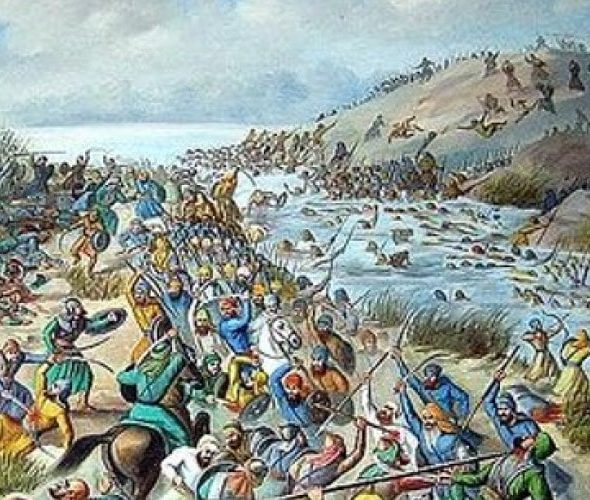BHAGAT SINGH (1907-1931), revolutionary and martyr, was born on 27 September 1907 at the village of Banga, Lyallpur district (now in Pakistan) the second son of Kishan Singh and Vidya Vati. Bhagat Singh was imbued from childhood with the family`s spirit of patriotism. At the time of his birth, his father was in jail for his connection with the Canal Colonization Bill agitation, in which his brother, Ajit Singh (Bhagat Singh`s uncle), took a leading part. Through his father, who was a sympathizer and supporter of the Ghadr campaign of 191415, Bhagat Singh became an admirer of the leaders of the movement.
BIBIPUR KHURD, locally called Bipur, is a small village in Patiala district, 8 km southeast of Ghuram (30° 7`N, 76° 28`E). It has a historical shrine, Gurdwara Patshahi Nauvin, sacred to Guru Tegh Bahadur, who visited the site during one of his travels through Malva and Bangar regions. The Gurdwara, out in the fields, is a single rectangular room, with a 4metre wide verandah in front, built in 1964. It is managed by a village committee. Special divans take place on the first of every Bikrami month, and an annual festival is held on the occasion of Hola Mohalla, recalling the Festival of Procession at Anandpur Sahib in the month of March.

CHHOTA GHALLUGHARA, lit. minor holocaust or carnage, as distinguished from Vadda Ghallughara (q.v.) or major massacre, is how Sikh chronicles refer to a bloody action during the severe campaign of persecution launched by the Mughal government at Lahore against the Sikhs in 1746. Early in that year, Jaspat Rai, the faiydar of Eminabad, 55 km north of Lahore, was killed in an encounter with a roving band of Sikhs. Jaspat Rai\'s brother, Lakhpat Rai, who was a diwan or revenue minister at Lahore, vowed revenge declaring that he would not put on his head dress nor claim himself to be a Khatri, to which caste he belonged, until he had scourged the entire Sikh Panth out of existence.
FOULKES, R. (d. 1841), an Englishman, who joined Maharaja Ranjit Sihgh`s cavalry in February 1836. He remained attached to General Ventura as aide-de-camp, and accompanied him on his expedition to Mandi in 1840. On file conclusion of the campaign, he was left in charge of the Sikh troops stationed at Mandi. However, his troops mutineed in March 1841, and assassinated him.
GOBIND RAM, BHAI (d. 1845), son of Bhai Harbhaj and a grandson of Bhai Vasti Ram, had, like his brother Bhai Ram Singh, an honoured position at the court of Maharaja Ranjit Singh. A good scholar of Sanskrit and Persian, Gobind Ram, was of a retiring nature and more interested in spiritualism and medicine. According to Sohan Lal Suri, the court historian, Maharaja Ranjit Singh was highly impressed by Gobind Ram`s knowledge of metaphysics and often had long discussions with him. Bhai Gobind Ram, who suffered a paralytic stroke in 1840, died at Lahore on 23 March 1845.
- 1
- 2



